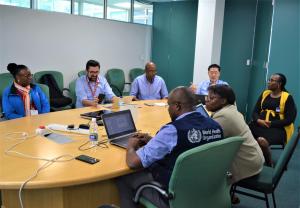Building capacity of COVID-19 Frontline Health Workers
Namibia’s two COVID-19 index cases were reported on 13 March 2020 and the country has since reported 34 cases as of 16 June 2020. Approximately 87% of the cases are imported with no reported community transmission as most cases are from travellers held in quarantine facilities in different regions. Capacity development of front-line health workers is essential if the regions are to contain the spread of the virus. In response, WHO with the Ministry of Health and Social Services provided a virtual integrated training from May 06 until May 22, 2020 to help prepare regions respond more efficiently to this outbreak. The limited movement and no mass gathering guidelines led to the virtual training of health care workers at the comfort of their offices and homes as long as they had access to internet, laptop or desk top.
The training was extended to all participants who were intrigued to learn about COVID-19 preparedness and response including:
- Outbreak preparedness and response teams at regional and district levels; regional health emergency management and district health, emergency management committee members, such as regional directors, chief/senior medical officers, nurse managers, public health care supervisors, surveillance officers, infection prevention and control (IPC) focal points, public and environmental health officers, trainers from regional health training Centres (training network) logisticians/administrators, national institute of pathology laboratory technicians, and social workers, from the Ministry of Health and Social Services, Ministry of Defense (MoHSS), Ministry of Defense (MoD), and Correctional Services.
- Operational levels countrywide covering staff from public and private health facilities; ministries involved in COVID-19 response; non-governmental organizations and international organizations; person’s in-charge of facilities, Red Cross staff, medical related interns/volunteers/graduates in the relevant fields etc who are in charge of COVID-10 preparedness and response.
The twice-daily sessions (09:00-11:00hrs and 14:00-16:00hrs) incorporated a diverse range of topics inclusive of coordination, surveillance, points of entry, rapid response teams, Laboratory, case management and infection prevention and control, risk communication and community engagement, mental Health and psycho-social support. Prior to the training all participants were registered by WHO and a training timetable with the various topics to be covered to enable participants plan for their attendance.
The objectives of the sessions were:
- To enhance a well-coordinated, planning and monitoring of response interventions at sub-national levels and enhance timely sharing of situation updates with all relevant stakeholders (state and private clinicians and partners);
- To increase regional and district level capacity to promptly detect cases and follow-up all suspected cases and contacts;
- To detect suspected cases and contacts at Points of Entry and at roadblocks in collaboration with Security officials;
- To isolate and provide timely optimized care for suspected and confirmed cases at home and in health facilities;
- To prevent human-to-human transmission among close contacts, health care workers, and transmission amplification in local communities;
- To strengthen risk communication and community engagement to facilitate health promotion activities with/ by communities;
- To maintain essential services during an outbreak, including psycho-social support and socio/economic/poverty mitigation.
The online interactions are proving to be a positive initiative in contributing to the country's preparedness and response. For innovations and new approaches to succeed especially now during the COVID-19 pandemic, strong leadership, partnership and collaboration between government and partners is paramount. Although the first phase of the training was challenging, the facilitators from government and partners were able to come together to develop online training materials and facilitate the sessions using real life and practical examples derived from their experience, knowledge and skills. The following Ministries and partners were involved in the design and implementation of the online training; Office of the Prime Minister, Ministry of Health and Social Services, Ministry of Defense, WHO, CDC, UNFPA, UNICEF, UNDP, University of Namibia, Namibia Institute of Pathology, Namibia Statistics Agency, Ministry of Agriculture Water and Land Reform, City of Windhoek and Namibia Airports Company.
The training attracted close to 1000 participants from government, academia and civil society organizations: infection prevention and control (104), case management (96), risk communication and community engagement(103), mental health and psycho-social support (100), surveillance (121), coordination (64), rapid response teams (52) and laboratory (59). Participants expressed their appreciation of the training stating that it helped them better understand COVID-19 and what is expected in their regional response plans. They however requested an improvement in segmenting the training audience to increase participation of the MoHSS front-line health workers and perhaps consider having evening sessions for those who may not be able to take time during the normal working hours for the training. The facilitation team shared all presentations and additional resource materials. These were useful for most regions who reported their first cases after the training as the regions used this to review their response and guide immediate public health interventions.
A second phase of the training is envisaged which will include simulations and more practical sessions targeted at different front-line health workers in regions and districts. Key lessons learnt and recommendations obtained from the first training will be used in improving the next phase of training. Training organizers established the need for targeted invitation for specific participants and change of session time to accommodate those not available during the normal work days and hours.



